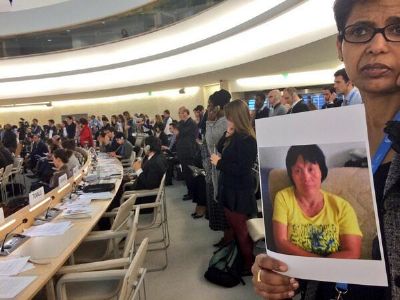On Thursday, March 20, 2014, the Council took up the human rights record of China. It was the second stage of the UPR process on China, which began at the Council's UPR session in October 2013. China introduced its (horrendous) human rights record this way: "My government has taken vast initiatives to advance the cause of human rights."
Those initiatives include the following. In September 2013 Chinese human rights activist Cao Shunli was detained after she staged a two-month sit-in at the foreign ministry with other activists, pressing authorities to allow the public to participate in the UPR process involving China. Authorities first detained Cao at Beijing airport on September 14, as she was en route to Geneva to participate in a human rights program. She was formally arrested one month later on suspicion of "picking quarrels and provoking trouble". Cao suffered from several conditions, including tuberculosis, liver disease and uterine fibroids but Beijing's Chaoyang district detention centre, where she was held, refused to give her medical treatment for months, causing her condition to deteriorate. Cao was finally taken to the hospital on February 19, 2014 after she fell into a coma. On March 14, 2014, shortly before stage two of the Chinese UPR in Geneva, Cao Shunli died.
On March 20, 2014, during stage two of China's UPR, several NGOs took the floor. The International Service for Human Rights told the story of Cao Shunli and called for "a moment of silence" to remember her. The Chinese delegate immediately raised a point of order and objected to the moment of silence on procedural grounds. He was supported by Cuba, Russia, Iran, Saudi Arabia, Pakistan, Venezuela, Vietnam, Morocco, Algeria, South Africa, Maldives and Egypt. At the same time, NGO representatives were standing in the back of the room with pictures of Cao Shunli. Iran's representative asked that the pictures be removed. Canada, U.S., UK, France, Germany, Austria, Estonia and Ireland all supported the right of NGOs to use their allotted speaking time as they wished.
The President of the Council then decided that he would discuss the issues surrounding China's objection later and that the UPR of China should proceed. The Chinese delegation however insisted that the Council decide on the issue "straight away." The members of the Council then proceeded to a roll-call vote where each member was asked, in effect, whether they supported the right to free speech at the Council and more specifically if they supported a moment of silence for Cao Shunli.
Only 13 Council member states voted in favor of the President's decision to delay a vote and to discuss the issue further - that is, supported freedom of expression and a moment of silence, while 20 voted against and 12 abstained. Thus the moment of silence for Cao Shunli - who died trying to bring the human rights of those in China to the attention of the Council - was disallowed by the very same Council.
Moreover, China took other steps to silence freedom of speech at the Council. It interrupted the statement of the International Federation for Human Rights League (FIDH) because they were speaking on behalf of its member organizations - namely Human Rights in China and International Campaign for Tibet. The FIDH rep was allowed to proceed only after several points of order were raised and Canada, U.S., France, Germany and the UK intervened.
While NGOs were harassed and silenced during China's UPR, states were free to comment and did. Rogue states enjoy using the UPR to applaud the worst human rights abusers and criticize democracies in order to deflect attention from their own abysmal records. Their comments on China, therefore, included:
- Cuba: We draw attention ...to progress in...rights of children, women and freedom of religion.
Djibouti: We recognize the remarkable efforts made and achievements of China in the area of strengthening the human rights in the country.
Egypt: Egypt expresses its support for the national efforts of the People's Republic of China towards promoting and protecting human rights.
Eritrea: We congratulate the government of China in its efforts to discharge its obligations in the promotion and protection of basic human rights.
Gabon: We recognize efforts made by China in the area of promotion and protection of human rights.
Iran: We appreciate government's endeavors in improving the national legislative and judicial framework and policies to promote and protect all human rights of its people.
Lao People's Democratic Republic: We commend China's remarkable progress in promoting and protecting the human rights in the country.
Lebanon: We would like to take this opportunity to commend China for the efforts they have made on the framework of the UPR.
Sudan: We welcome the progress in the human rights sector in China.
This is the reality of the UN's top human rights body - where China itself is an elected member.

